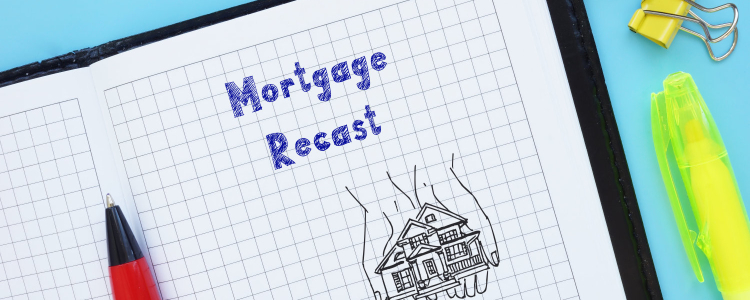Shared from Corporette.com
Readers were recently discussing mortgage recasting in the comments, and we thought the topic deserved its own post. Pretty much everyone who has a home loan is familiar with refinancing (and signs point to 2022 being a good year to do it), but recasting is a less well-known option that’s worth a look, depending on your money situation.
While we’ve talked a lot about home buying and mortgages over the years, recasting is something we’ve never addressed — so to learn more, we turned to Elizabeth Root, director of purchase at digital homeownership company Better, who answered all of our mortgage recasting questions via email.
Readers, have you been curious about mortgage recasting? Have you ever recast a mortgage? Have you ever refinanced?
Note: Here are a few useful online tools to crunch the numbers on your loan: a mortgage recast calculator (not very pretty, but it does the job), a general amortization calculator, and a refinance calculator.
Corporette: What does it mean to recast a mortgage?
Elizabeth Root: Recasting a mortgage is when a borrower makes a large, lump-sum payment toward the principal balance of their mortgage, and the lender, in turn, re-amortizes the loan. This means that your loan is reduced to reflect the new balance. Recasting cuts your monthly payments and the amount of interest you’ll pay over the life of the loan. However, it does not affect your interest rate or the length of your loan.
{related: when to buy a second home}
What situations make recasting a good idea, and is it ever not a smart move?
Benefits of recasting
- If your home’s value has increased recently, recasting could be a great way to lower your monthly PMI, or get rid of it altogether!
- It’s easy to do, and it’s a relatively inexpensive way to lower monthly payments if you have the cash.
- You lower your monthly payments by making one lump sum.
- You don’t have to requalify for a new loan or pay any closing costs related to refinancing.
- If you have a low-interest rate, you can keep that low rate.
Drawbacks of recasting
- You’re putting a large sum of money into equity.
- More of your cash is tied up in equity.
- It doesn’t shorten the length of your mortgage.
- If you have a high-interest rate, you keep that high rate.
- The lender will charge a fee that can be a few hundred dollars.
- Not all servicers will allow for recasting. Oftentimes they will specify the minimum amount that you must pay toward your principal in order to recast. This amount can vary, but may be between $5,000–$10,000.
{related: buying a home: tips and tricks}
If you’re deciding between refinancing and recasting, what are the factors to consider?
With recasting, you’re keeping your existing loan and only adjusting the amortization. You cannot get a lower interest rate with recasting. This is great if your interest rate is already low. With a refinancing, you apply for a brand-new loan and the fees that go with it. Because you end up with a new mortgage with refinancing, you get a new, lower interest rate. This is great for homeowners with high interest rates.
Keep in mind if you already have a fixed-rate mortgage with a low interest rate, then a refi might not be beneficial. But, if you have a low-interest, fixed-rate mortgage and want lower monthly payments, then a recast might be a good option.
{related: paying down debt vs. saving}
Would it ever be better to pay extra on the principal every month rather than recast your mortgage?
There are benefits to paying extra on the principal every month. You’ll save thousands of dollars in interest payments and have financial freedom earlier. However, if you have other debt, you may not want to pay extra towards the principal. Mortgage debt almost always has a lower interest rate than any other debt, so it costs you a lot less to hang onto it.
Also, if you’re not saving money for retirement, your extra cash will likely do you more good if you’re investing it or saving it than if you’re paying off a low-interest mortgage or putting it towards a recast. Furthermore, emergencies pop up. It’s a smart idea to have cash saved up to cover these inevitable expenses such as unplanned medical or car bills. If putting more money towards your mortgage, whether extra payments or recasting, means that you don’t have any cash saved up, you’ll likely have to take on high-interest debt to cover such emergency expenses.
Readers who own a home, we’d love to hear your experiences: Have you ever recast a mortgage? How much was your lump sum payment, and how did your PMI change? Have you ever refinanced instead of recasting?
Stock photo via Deposit Photos / rummess.
Images and Article from Corporette.com
#Recast #Mortgage


